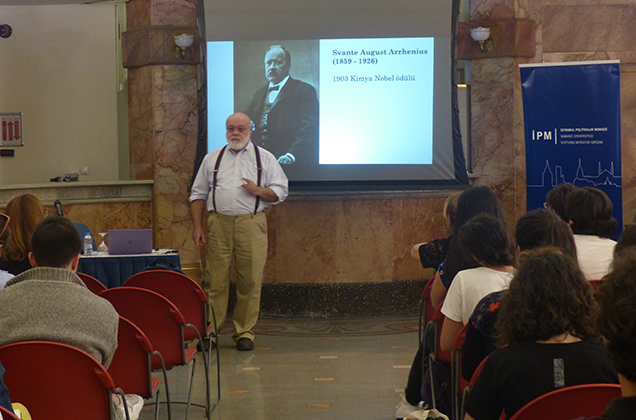19/10/2018
IPC Climate Cafe Talks continue with "A Historical Look into the Science of Human-Induced Climate Change"
The fifth bi-monthly Climate Cafe Talk organized by the Sabancı University Istanbul Policy Center was given by Professor H. Nüzhet Dalfes from the Istanbul Technical University Eurasia Geological Institute. Titled "A Historical Look into the Science of Human-Induced Climate Change", the lecture summarized the historical development of scientific work on climate change caused by humans, and discussed the synergy between climatology studies and developments in information technologies.

This year's first Climate Cafe Talk series, a bi-monthly event featuring scientists and academics working on Climate Change to cover climate change-related issues from politics to atmospheric sciences, economics and psychology, was held by the Sabancı University Istanbul Policy Center.
The speaker in the fifth Climate Change Talk of the series was Professor H. Nüzhet Dalfes from the Istanbul Technical University Eurasia Geological Institute, whose lecture was titled "A Historical Look into the Science of Human-Induced Climate Change".
Professor Dalfes said, “Many believe that the impact of elevated carbon dioxide on the climate of the Earth is a recent discovery. In fact, the effects of carbon dioxide and other greenhouse gases have been known since the late 19th century. We have also been aware of the accumulation of carbon dioxide released by fossil fuels, the role of the oceans, and their possible consequences for almost 50 years."
Future Projection in Climate Change: Deciding on uncertainties
Professor Dalfes commented on the future of climate science:
“Higher spatial resolution, more realistic surface processes (like vegetation or carbon cycle), repeated simulations to overcome uncertainties, growing data sets and more powerful computers enable us to have a clearer picture of the future of climate change.”
About Professor Nüzhet Dalfes:
Professor Nüzhet Dalfes has been involved in climate, paleoclimate, and climate change studies for 38 years, and has a bachelor's degree in Physics from Boğaziçi University and a master's degree in Geophysics from the Istanbul Technical University. Dalfes holds a PhD from the Rice University Astrophysics and Astronomy Department, and completed his dissertation at the National Center for Atmospheric Research (NCAR) in Boulder, USA. He worked as a researcher at the Dynamic Meteorology Lab in France and the TÜBİTAK Marmara Research Center in Turkey. He was an associate professor at the Boğaziçi University Environmental Sciences Institute from 1990 to 1992, where he gave lectures on climatology and ecology. He worked as an adminmistrator in information- and geology-related divisions at the Istanbul Technical University for many years. Currently, Professor Dalfes teaches at the ITU Eurasia Geological Institute, and works on research in regional climate change, ecosystem modeling, and informatics in ecology. He was a member of the (now defunct) Natural Life Preservation Society board of directors from 1992 to 1996 and from 2003 to 2004. Since 2012, Dalfes has been working on building a phenology observation network based on "citizen science" (TRFeno), and an observation network of "phenocameras."
About Climate Cafe Talks
Climate Cafe Talks was launched by the Sabancı University Istanbul Policy Center in the 2017-2018 academic year. So far, the series held 5 events and received 200 guests, and plans to hold another 5 events in the 2018-2019 academic year.
The bi-monthly event is a venue for scientists and academics working on climate-related issues to to reveal and discuss their work. Climate Cafe Talks provides an interdisciplinary environment to cover climate change-related issues from politics to atmospheric sciences, economics and psychology.
http://ipc.sabanciuniv.edu
http://twitter.com/ipc_ipm
http://www.facebook.com/IstanbulPolicyCenter




